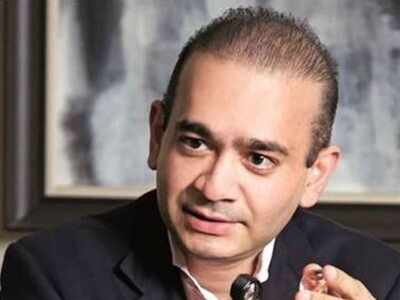Risk of Covid outbreaks at Arthur Road Jail and being held in solitary confinement puts Nirav’s health at risk, UK court told

LONDON: There is a high risk of further Covid-19 outbreaks at Arthur Road Jail in Mumbai where Nirav Modi will be housed if extradited, and holding him there in solitary confinement will lead to a further deterioration in his mental health, the Westminster magistrates’ court heard on Thursday.
“There is a 5% chance of Nirav Modi acquiring Covid, and if he did get it severely, there is a 15% chance of him dying,” Prof Richard Coker, emeritus professor of public health at the London School of Hygiene and Tropical Medicine, said, appearing as a witness on behalf of Nirav. “That amounts to a 0.75% chance of him dying from the virus.”
Coker said the lockdown at the prison in March — which preceded a Covid outbreak in May in which 182 inmates tested positive — demonstrated its measures were insufficient. He added the jail’s screening and testing methods appeared inaccurate and ineffective.
“Prisons are perfect settings for infectious diseases to get into and explode,” he said, pointing out Covid prevalence was 57% in Mumbai’s slum population and 16% in the rest of Mumbai. “I think there will be further outbreaks.”
Helen Malcom QC, representing the Indian government, pointed out three Indians from the investigating agencies were watching proceedings in the London court — having arrived from India — and said they had been exempted from the mandatory 14 days’ quarantine to allow them to attend. She added that by meeting them she was putting herself at risk of Covid-19. “We all have to accept some level of risk,” she said.
“Nirav’s removal will not be for at least another year – we cannot predict the situation in Mumbai then,” she said, adding “You accept that Barrack 12 is at significantly lower risk of Covid than Wandsworth because it’s empty and Modi may be there on his own, or with small number of others, separated from the rest of the prison, in a large airy cell?”
Nirav watched the proceedings via a video link from prison.He was dressed smartly and seemed engrossed in flicking through files of evidence.
Wandsworth prison’s consultant forensic psychiatrist, Dr Andrew Forrester, told the London court that Nirav had been diagnosed with severe depression partly caused by his extradition proceedings and the impact of the lockdown on Wandsworth jail conditions, and, combined with his mother’s suicide, this meant he presents a “high risk of suicide”.
“I feel hospital treatment is now indicated. If he deteriorates further and depression becomes even more severe, he may become unfit to plead in future,” Forrester said. “Severe depression cannot easily be mimicked,” he added. “I’m sure he is not deceptive. Solitary confinement is unhelpful for people with mental illness.”
Another witness for Nirav’s prison condition, expert Alan Mitchell, said he was concerned about healthcare provision and levels of inspection at Arthur Road Jail, pointing out the number of complaints about the prison were so low that they suggested that prisoners do not have confidence in the complaints system.
He also claimed the cell was darker inside than it seemed in the video shown to court, and the video “was not a substitute for a visit”, stating he had been refused access to visit.
He referred to evidence given in the hearing by an advocate named Yadav who described “rodents, mosquitoes, earthworms and insects” wandering around the jail, and noise and dust pollution from an adjoining slum.
“Barrack 12 is not right for Nirav’s mental health and wellbeing, The right solution would be a visit by a qualified prisons expert and allowing them to speak to the medical staff,” he told the judge.
“There is a real risk Nirav's health will further deteriorate.”
“Vijay Mallya might be there when Nirav gets back. Is it better for him on his own or with other people?” Malcolm asked, exasperated.
“Whatever is put before court, it doesn’t seem as if the government of India would ever satisfy you,” she said to Mitchell.
“There is a 5% chance of Nirav Modi acquiring Covid, and if he did get it severely, there is a 15% chance of him dying,” Prof Richard Coker, emeritus professor of public health at the London School of Hygiene and Tropical Medicine, said, appearing as a witness on behalf of Nirav. “That amounts to a 0.75% chance of him dying from the virus.”
Coker said the lockdown at the prison in March — which preceded a Covid outbreak in May in which 182 inmates tested positive — demonstrated its measures were insufficient. He added the jail’s screening and testing methods appeared inaccurate and ineffective.
“Prisons are perfect settings for infectious diseases to get into and explode,” he said, pointing out Covid prevalence was 57% in Mumbai’s slum population and 16% in the rest of Mumbai. “I think there will be further outbreaks.”
Helen Malcom QC, representing the Indian government, pointed out three Indians from the investigating agencies were watching proceedings in the London court — having arrived from India — and said they had been exempted from the mandatory 14 days’ quarantine to allow them to attend. She added that by meeting them she was putting herself at risk of Covid-19. “We all have to accept some level of risk,” she said.
“Nirav’s removal will not be for at least another year – we cannot predict the situation in Mumbai then,” she said, adding “You accept that Barrack 12 is at significantly lower risk of Covid than Wandsworth because it’s empty and Modi may be there on his own, or with small number of others, separated from the rest of the prison, in a large airy cell?”
Nirav watched the proceedings via a video link from prison.He was dressed smartly and seemed engrossed in flicking through files of evidence.
Wandsworth prison’s consultant forensic psychiatrist, Dr Andrew Forrester, told the London court that Nirav had been diagnosed with severe depression partly caused by his extradition proceedings and the impact of the lockdown on Wandsworth jail conditions, and, combined with his mother’s suicide, this meant he presents a “high risk of suicide”.
“I feel hospital treatment is now indicated. If he deteriorates further and depression becomes even more severe, he may become unfit to plead in future,” Forrester said. “Severe depression cannot easily be mimicked,” he added. “I’m sure he is not deceptive. Solitary confinement is unhelpful for people with mental illness.”
Another witness for Nirav’s prison condition, expert Alan Mitchell, said he was concerned about healthcare provision and levels of inspection at Arthur Road Jail, pointing out the number of complaints about the prison were so low that they suggested that prisoners do not have confidence in the complaints system.
He also claimed the cell was darker inside than it seemed in the video shown to court, and the video “was not a substitute for a visit”, stating he had been refused access to visit.
He referred to evidence given in the hearing by an advocate named Yadav who described “rodents, mosquitoes, earthworms and insects” wandering around the jail, and noise and dust pollution from an adjoining slum.
“Barrack 12 is not right for Nirav’s mental health and wellbeing, The right solution would be a visit by a qualified prisons expert and allowing them to speak to the medical staff,” he told the judge.
“There is a real risk Nirav's health will further deteriorate.”
“Vijay Mallya might be there when Nirav gets back. Is it better for him on his own or with other people?” Malcolm asked, exasperated.
“Whatever is put before court, it doesn’t seem as if the government of India would ever satisfy you,” she said to Mitchell.
Download
The Times of India News App for Latest World News

Coronavirus outbreak
Trending Topics
LATEST VIDEOS
More from TOI
Navbharat Times
Featured Today in Travel
Get the app









